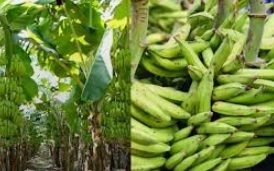How to Start Plantain Farming in Nigeria: Plantain farming is a lucrative agricultural venture in Nigeria, offering numerous economic opportunities for farmers.
With its high demand, adaptability to various soil types, and nutritional value, plantain farming has become a popular choice for both small-scale and large-scale farmers.
In this guide, we will provide a detailed step-by-step process on how to start plantain farming in Nigeria, covering essential aspects such as land selection, planting, cultivation, pest and disease management, and harvesting.
Recommended: How to start Rice Business in Nigeria
How to Start Plantain Farming in Nigeria
Land Selection:
Choosing the right location and soil type is crucial for successful plantain farming. Consider the following factors:
a. Climate: Plantains thrive in tropical and subtropical climates with temperatures ranging between 26-30°C (78-86°F). They require well-distributed rainfall, preferably around 1,500-2,500mm annually.
b. Soil Type: Opt for well-drained loamy or sandy soil with good organic matter content. The pH level should be between 5.5 and 7.0, ensuring optimal nutrient uptake.
c. Land Preparation: Clear the land of weeds, rocks, and debris. Prepare the land by plowing, harrowing, and leveling to ensure adequate drainage.
Planting:
Follow these steps to plant your plantain suckers:
a. Sucker Selection: Choose healthy and disease-free suckers from reputable sources. Look for suckers with at least four leaves and a pseudostem diameter of 5-7 cm.
b. Spacing: Maintain a spacing of 2.5-3 meters between plantain plants in rows, and 3-4 meters between rows. This allows for sufficient airflow and sunlight penetration.
c. Planting Technique: Dig holes measuring 30 cm in depth and width. Place the sucker in the hole, ensuring that the corm (base) is facing downward. Backfill the hole with soil, leaving the pseudostem exposed.
Cultivation:
To ensure optimal growth and yield, implement the following cultivation practices:
a. Watering: Plantains require consistent moisture throughout their growth cycle. Provide regular irrigation during dry spells, but avoid waterlogging, as it can lead to root rot.
b. Fertilization: Apply organic manure or compost during land preparation to improve soil fertility. Additionally, supplement with balanced fertilizers rich in potassium, phosphorus, and nitrogen at regular intervals.
c. Mulching: Apply organic mulch, such as dried leaves or straw, around the base of the plants to conserve soil moisture, suppress weed growth, and enhance nutrient availability.
Pest and Disease Management:
Protecting your plantain farm from pests and diseases is crucial for a successful harvest. Some common pests and diseases affecting plantains in Nigeria include banana weevils, nematodes, black sigatoka, and Panama disease.
Employ the following strategies:
a. Regular Inspection: Conduct routine field inspections to detect signs of pest infestation or disease development at an early stage.
b. Biological Control: Introduce beneficial insects or organisms that prey on pests as a natural control method.
c. Chemical Control: In severe cases, employ approved pesticides or fungicides following recommended guidelines.
Harvesting:
Harvesting time varies based on the plantain variety, typically occurring between 8-12 months after planting.
Look for the following signs to determine readiness for harvest:
a. Fruit Maturity: Plantains are ready for harvest when the fruit skin turns yellow and the flesh softens.
b. Harvest Technique: Cut the bunch with a sharp knife, leaving a small portion of the pseudostem intact to prevent damage to the next bunch.
Conclusion:
Plantain farming in Nigeria presents a lucrative opportunity for individuals interested in agriculture. By carefully selecting the land, using healthy suckers, implementing proper cultivation practices, and managing pests and diseases effectively, farmers can achieve substantial yields.
Remember to prioritize continuous learning and stay updated on the latest farming techniques to maximize your plantain farming success. With dedication, patience, and proper implementation of the guidelines provided, you can establish a thriving plantain farm and contribute to Nigeria's agricultural growth.

